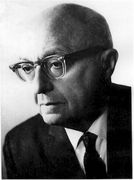- 詳細 2022年2月2日 22:44更新
-
詩人 チャールズ・レズニコフ
ユダヤ系アメリカ人
http://www.eng lish.ui uc.edu/ maps/po ets/m_r /reznik off/rez nikoff. htm
Charles Reznikoff
Charles Reznikoff was born on August 31, 1894, in Brooklyn, New York. His parents, Russian Jewish immigrants, had fled the pogroms that followed the assassination of Alexander II, and during Reznikoff's childhood many of his relatives joined the family in the United States. Reznikoff was a precocious student, graduating from grammar school when he was eleven, three years ahead of his class. At the age of sixteen, he went to study journalism at the University of Missouri, but he abandoned this endeavor after a year to pursue a degree in law, which he earned from New York University in 1915. He was admitted to the Bar of the State of New York in 1916, but he practiced law only briefly, "because I wanted to use whatever mental energy I had for my writing."
Reznikoff's first book of poetry, Rhythms, was privately published in 1918. He took a series of writing and editing jobs to support himself, working on the editorial staffs of the American Law Book Company and, beginning in 1955, the Jewish Frontier. In 1930, Reznikoff married Marie Syrkin, who later became a distinguished professor at Brandeis University. Throughout the 1930s, Reznikoff gained recognition as one of the principal proponents of Objectivism, along with Louis Zukofsky, George Oppen, and Carl Rakosi. The group of poets established the Objectivist Press, which published three of Reznikoff's books. His work enjoyed little commercial success, however, and much of it continued to be self-published.
The most comprehensive edition of Reznikoff's work is Poems 1918-1975: The Complete Poems of Charles Reznikoff (Black Sparrow Press, 1989). His other books of poetry include Holocaust (1975) and Testimony (1965), which are his most celebrated works, as well as Going To and Fro and Walking Up and Down (1941), Jerusalem the Golden (1934), Poems (1920), and Rhythms (1918). He also published several prose works and a number of plays. After his death, a novel entitled The Manner Music was discovered by his patron, John Martin, and published posthumously in 1976, with an introduction by Robert Creeley.
Apart from his foray in the south and a year spent as a Hollywood screenwriter in the 1930s, Reznikoff was a lifelong resident of New York City. He died on January 22, 1976.
A Selected Bibliography
Poetry
Going To and Fro and Walking Up and Down (1941)
Holocaust (1975)
Jerusalem (1934)
Poems (1920)
Poems 1918-1975: The Complete Poems of Charles Reznikoff (1989)
Rhythms (1918)
Testimony (1965)
Prose
By the Waters of Manhattan (1930)
Stories and Fantasies from the Jewish Past (1961)
Testimony (1934)
The Lionhearted (1944)
The Manner Music (1976)
Plays
Chatterton, the Black Death, and Meriwether Lewis: Three Plays (1922)
Coral and Captive Israel: Two Plays (1923)
Nine Plays (1922)












